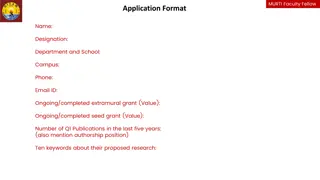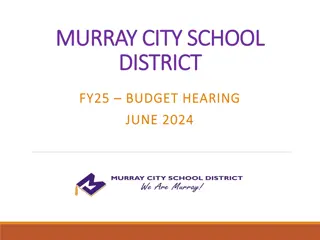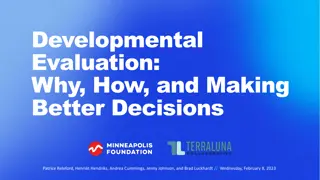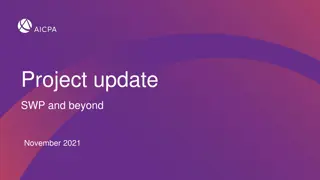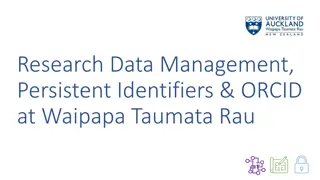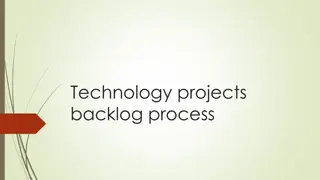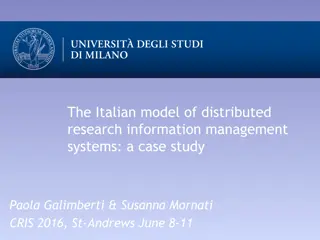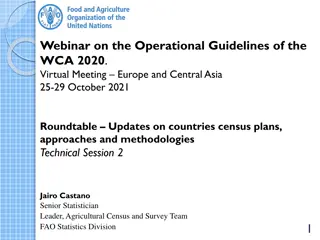Evaluation Activities at PIDS: Types, Completed, Ongoing, Proposed
A comprehensive overview of evaluation activities at the Philippine Institute for Development Studies (PIDS), including completed evaluations such as TESDA scholarship programs, ongoing evaluations like Sustainable Livelihood Program, and proposed evaluations for the coming years. The content covers various aspects of evaluation design, questions, results, and utilization across different government programs and initiatives.
Uploaded on Aug 13, 2024 | 0 Views
Download Presentation

Please find below an Image/Link to download the presentation.
The content on the website is provided AS IS for your information and personal use only. It may not be sold, licensed, or shared on other websites without obtaining consent from the author. Download presentation by click this link. If you encounter any issues during the download, it is possible that the publisher has removed the file from their server.
E N D
Presentation Transcript
Evaluation at PIDS Evaluation at PIDS Aniceto Orbeta, Jr. , Senior Research Fellow Philippine Institute for Development Studies Surian sa mga Pag-aaral Pangkaunlaran ng Pilipinas www.pids.gov.ph 1
Outline Types of Evaluation Activities Evaluations Completed, On-going, Proposed Selected Evaluations (Design, Evaluation Questions, Results, Utilization) 2
Two Types of Evaluation Activities IE-Training Evaluations 3
Training NEDA, DBM, PIDS Staff For 3ie 3ie-cooperating Agencies (DSWD, DOLE, OPAP), Oversight Agencies, Academe (SUC faculty) 4
Evaluations Completed TESDA Scholarship Programs SGP-PA/ESGP-PA CCT Further analysis on impact on dependency Irrigation Program School-based Feeding Program Agricultural Insurance Program National Greening Program of DENR Shared Facility Program of DTI Selected Government Water Supply and Sanitation Programs Motor Vehicle User s Charge 5
Evaluations On-going Sustainable Livelihood Program (DSWD) (with 3ie) Bottom-up Budgeting (DILG) 6
Evaluations Proposed (2017-2018) MBT-BLE Process evaluation and baseline K-12 DepEd Implementation process evaluation K-12 CHED interventions Process evaluation and baseline SGP-PA Tracer and IE CCT 3rd Wave Analysis Convergence Program (DSWD) 7
Selected Evaluations TESDA Scholarship Programs (Up to 2010) Nature: Process and impact evaluation Evaluation question How are TESDA scholarship programs (TWSP, PESFA) performing? IE Design Matching based on propensity scores (scholars vs non-scholars) Results Performing well in terms of internal efficiency (graduation) Not performing well in terms of external efficiency (employment) PESFA perform slightly better than non-scholars but TWSP scholars performance not different from non-scholars Low external efficiency not just a problem of scholarship but the TVET graduates in general Utilization DBM recommendations on funding the program (?) 8
Selected Evaluations Student Grants-in-Aid for Poverty Alleviation Nature: Process and interim evaluations Evaluation questions How are grantees performing relative to their peers? What are the implementation issues? IE Design: Comparison of Grantees vs Peers Results Grantees lagging peers in entrance exams, socioeconomic background Entrance examination positively correlated with academic performance Grantees lagging peers in first year academic performance English, Science, Math Grantees performing at par with peers in second year Utilization HOR Committee on Poverty Alleviation adopting some or the recommendations of the study, e.g. entrance examination, full-funding Used to argue for importance of qualifying examinations in the UniFAST law 9
Selected Evaluations CCT Further estimation using Wave 1 data to determine CCT impact on dependency Design: RCT Results Grantees have not become dependent on grants based on labor market outcomes (labor force participation, employment, hours of work, looking for work when unemployed) Paid labor hours reduced but the incidence of child labor not affected Utilization Used results to argue that the dependency argument has no empirical basis 10
Selected Evaluations Sustainable Livelihood Program (On-going) Nature: Two process evaluations (completed), IE (on-going) Evaluation questions Is there a better way of sorting beneficiaries between Micro- enteprise Development and Employment Facilitation tracks? Is PESO a better way of providing employment facilitation? Design: RCT 11
Lessons No substitute for solid empirical evidence in arguing for or against a program Role of oversight agencies (DBM, NEDA) in convincing implementing agencies of the importance of doing the evaluation cannot be overemphasized Role of evaluation-conversant agency champions very critical Adherence to basic evaluation protocols need to be emphasized Clarifying Theory of Chance Selecting the appropriate counterfactual Protecting evaluation areas from undue interference until completion Primacy of generating evidence of what works and what does not work Importance of promoting learning organizations Importance of external collaborations 12
Thank You Philippine Institute for Development Studies Philippine Institute for Development Studies Surian sa mga Pag-aaral Pangkaunlaran ng Pilipinas WEBSITE: www.pids.gov.ph FACEBOOK: facebook.com/PIDS.PH Service through policy research TWITTER: twitter.com/PIDS_PH EMAIL: youremail@mail.pids.gov.ph 13
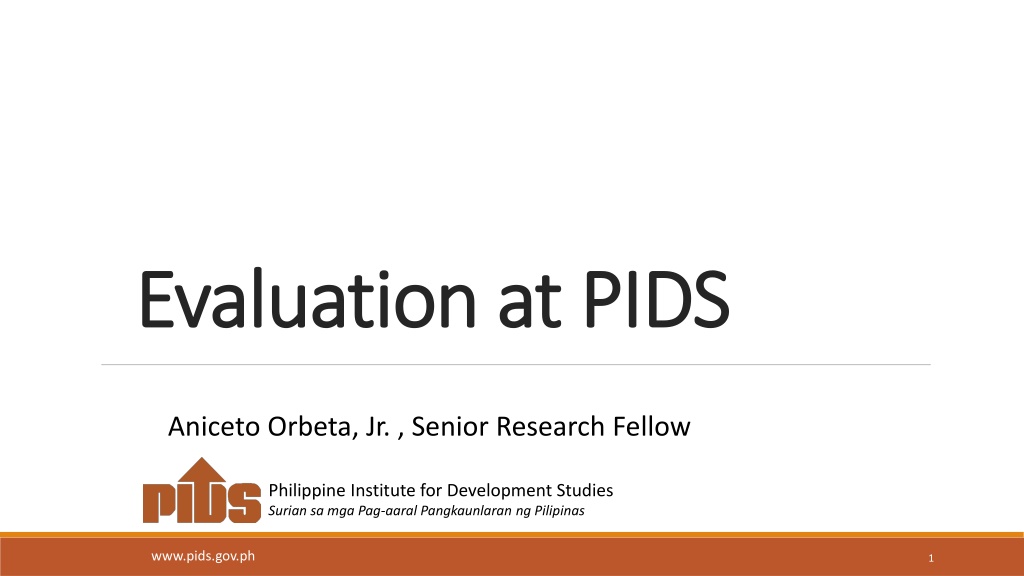
 undefined
undefined





